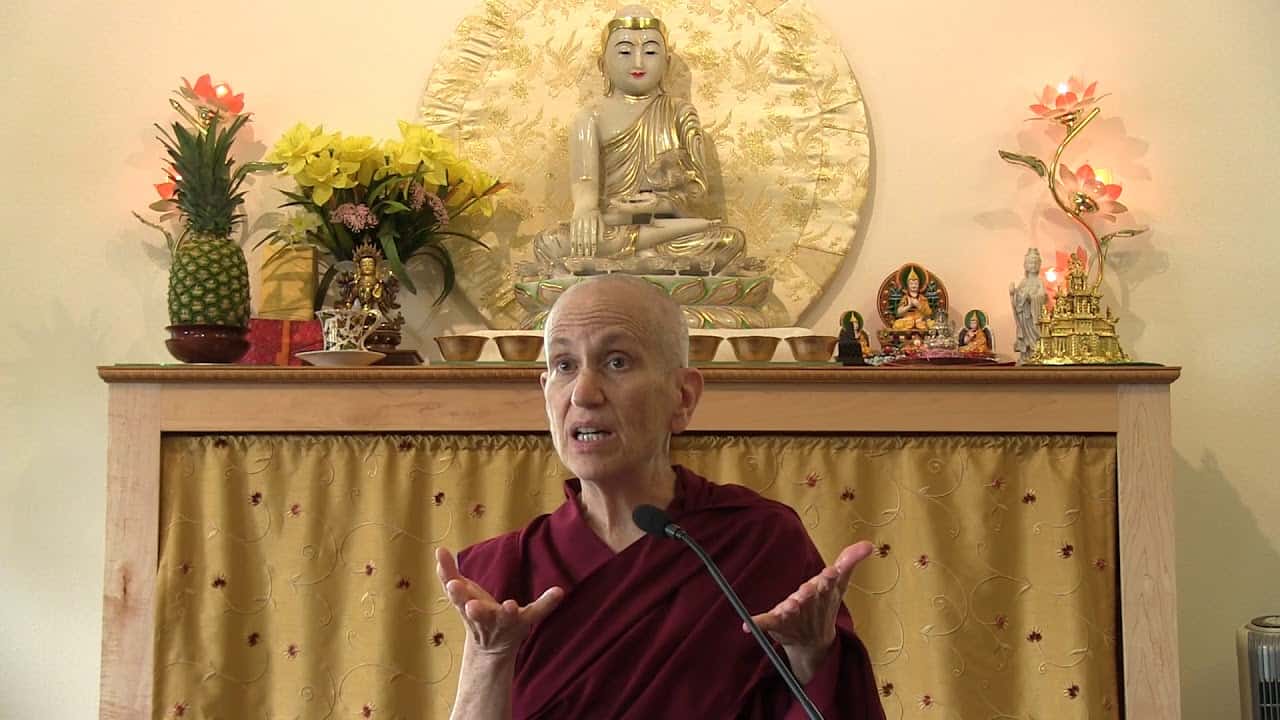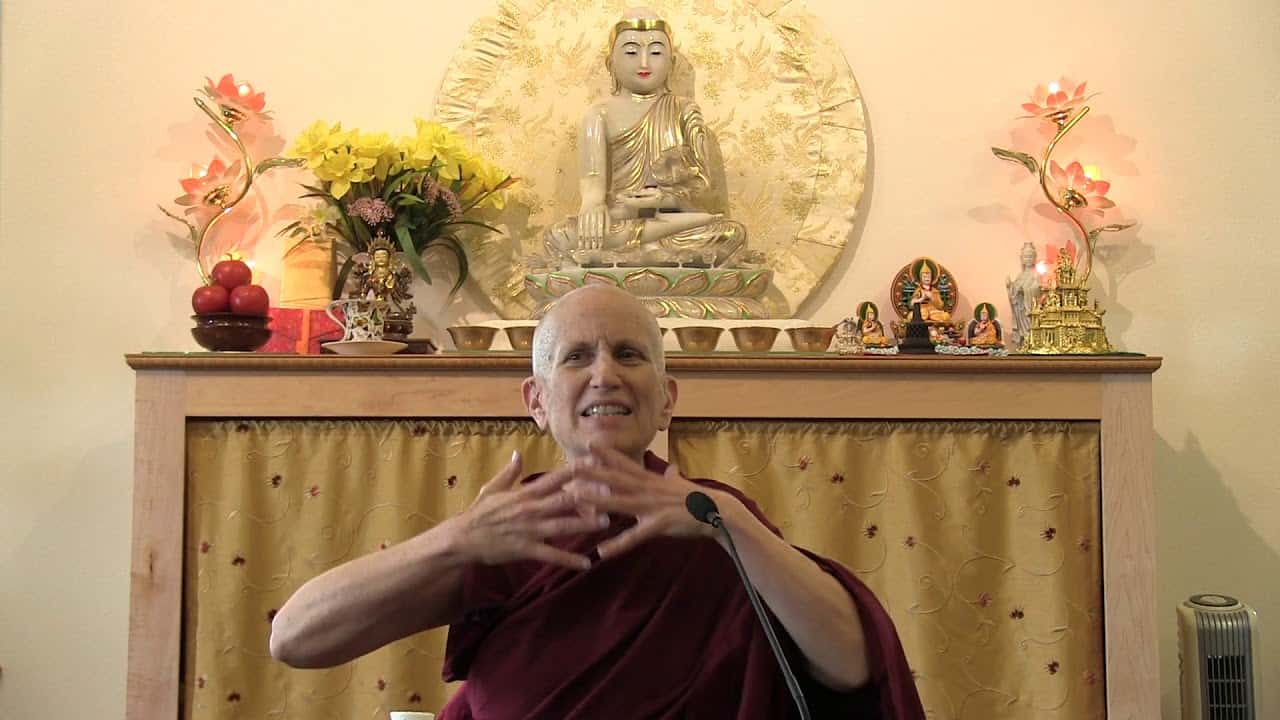Being an example of wisdom
Part of a series of short talks on the pithy verses from the end of Lama Yeshe's book When the Chocolate Runs Out.
- The two basic kinds of wisdom
- Living in ethical conduct
- Checking our motivation
- Seeing how things exist
The next thing from Lama Yeshe:
Live in harmony with one another
and be an example of
peace, love, compassion, and wisdom.
We’re on being an example of wisdom today, the last one. Here when we’re talking about wisdom there are two basic kinds of wisdom. There’s actually many kinds of wisdom but two basic kinds. One is involving the conventional truths, in specific how the functioning of the law of karma and its effects and then the wisdom of the ultimate nature.
When Lama is saying to be an example of wisdom, if we start out with the wisdom of cause and effect that’s the wisdom that helps us live in ethical conduct and to make good decisions in our life instead of just being influenced by emotion, or wrong views, or whatever. “Oh I feel like doing this” and so I run off in an impulse and do something and then later go, “Oh my god what did I get myself into here.” This wisdom of conventional things is really very important for living a sane life, to be able to see that our words, our deeds, and our thoughts have influence not only on our future lives but also on this life and also on other people. If we’re aware of that, then before we act there’s this automatic checking in our mind: “What is my motivation? Is what I’m doing something in accord with ethical conduct or is it against what I’ve learned in the teachings, what the Buddha has recommended us to do, to practice and to avoid?” That kind of wisdom that stops and pauses and thinks is so important in our lives.
As you’ve heard me say many times, one of the inmates that I wrote to for many years, he got a twenty year sentence. He was a big drug dealer in LA and got a twenty year sentence when I think he was just in his early thirties so that was a really big thing for him. While he was in prison he started tracing back. How did he get to the point where he was busted for being a big drug dealer? And he began to see that there were decisions all the way along his life—he called them SUDS: seemingly unimportant decisions—and how these things, when you don’t think carefully, then one decision put him in another place where he had a range of decisions which then he wasn’t careful about and he chose something else and then it eventually led him…. He had made a ton of money, he had decided to live abroad because he knew it was dangerous for him in the States, but then there was the opportunity to do one more big deal and really score a lot of money and he thought he could do it and that’s when the other shoe dropped and he wound up with a twenty-year sentence.
I’ve also heard several of the guys I write to say that for them coming to prison was a good thing because they might have been dead if they hadn’t gone to prison. So this is all in a thing of reminding us to slow down and not be so impulsive and really think about what the results are of what we’re thinking, what we say, what we do. If we do that I think we’ll be a lot happier this lifetime, have much better relationships with people and then we won’t create so much destructive karma. We’ll create a lot of virtue and then at the time of death you’re not all tormented with a lot of regret and remorse.
When Lama is saying “be an example of that kind of wisdom,” when we see people who make good decisions and who keep ethical conduct it impresses us, doesn’t it? When you think of people you know and you watch how they live their lives and what they say and do and how they treat other people and all of that has to do with this wisdom of karma and its effects. Then these people, there’s something about them that we want to become like them. That’s what the wisdom, conventional wisdom having to do with karma
Then the ultimate wisdom is what knows actually the ultimate mode of existence and how things really exist. As we develop that kind of wisdom it helps us to not be so attached, not be so angry, not get so jealous, and so arrogant, and so on, because we come to see that the things that we place so much importance on don’t exist the way they appear. Especially the self doesn’t exist as an independent, inherently existent person as it appears to. Therefore, who are we defending? Who is there to defend? We don’t need to get so defensive when people give us feedback that we don’t like because who is that about anyway? Similarly, when our mind gets quite jealous or greedy or whatever, then we can reflect: who is this person who wants this or thinks they must have this so badly? And what is it that they’re wanting and think they must have? What is it really? And then you dissect it and it’s just maybe a bunch of atoms and molecules. Or maybe it’s just something, an idea that you learned that is simply an idea society has that society created that we don’t have to live by, society’s definition of success and failure for example. We see that things don’t exist in the way they appear, and that wisdom is quite liberating on a day to day basis, and of course leading us to non-abiding nirvana.
Again all of these come about through our own internal practice not just through knowing words but through really applying the teachings we hear to our lives so that the teachings influence how we act and how we think and what we do.
Venerable Thubten Chodron
Venerable Chodron emphasizes the practical application of Buddha’s teachings in our daily lives and is especially skilled at explaining them in ways easily understood and practiced by Westerners. She is well known for her warm, humorous, and lucid teachings. She was ordained as a Buddhist nun in 1977 by Kyabje Ling Rinpoche in Dharamsala, India, and in 1986 she received bhikshuni (full) ordination in Taiwan. Read her full bio.


